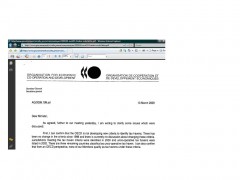04/05/2009
The mask fell: Luxembourg pressure on the OECD at the great day (update)
The Luxembourg government published a letter from Angel Gurria to Luc Frieden
By publishing this letter the Luxembourg government shows how politics influence the OECD policies:
Let’s read a couple of paragraphs:
I can confirm that the OECD is not developing new criteria to identify tax havens
I can also confirm that from an OECD perspective, none of our Members qualify as tax havens under these criteria
In formulating their requests, competent authorities should demonstrate the foreseeable relevance of the requested information. It would, for instance, not be possible for a State to request information randomly on bank accounts held by its residents in banks located in the other State.
This is definitely a political fault as it is an awkward operation that is intended to make pressure on the OECD to prevent any sanction against Luxembourg and any evolution to the OECD criteria.
It is not the first time that the Luxembourg government makes public a letter to make pressure. Last October, Arlette Chabot, information director for French TV station France 2, had written an apology to the Luxemourg Prime Minister, Jean-Claude Juncker, after her station suggested that not all is well in the jurisdiction. The letter was not intended to be public and Arlette Chabot was surprised. The communication was intended to discourage questions on Luxembourg
As far as the publication of Gurria's letter is concerned, it allows Luxembourg not abide by the commitments taken as none of the OECD Members qualified as tax havens when the letter was written all the more than the OECD is not developing new criteria to identify tax havens.
06:41 Posted in Luxembourg | Permalink | Comments (0)
04/04/2009
Towards a fair and true list of harmful havens
The OECD list that was published the day before yesterday is neither fair nor true.
It is not fair as it stigmatise some jurisdictions on a grey list while condoning the US Tax Havens like Delaware, but it is true that the USA are the major contributor to the OECD budget and condone as well the US tax havens on the Stop Tax Havens Abuse Act.
It is not true as it does not take into account every parameter. As I wrote, harmful tax practices, corruption, money laundering… are definitely connected and must me assessed on a unique list as a whole. Furthermore it is inconsistent as the split of the grey list is not coherent: How a jurisdiction like Cayman Islands that signed 8 agreements or Netherlands Antilles, Antigua and Barbuda that signed 7 can be considered as tax havens while Austria, Chile, Guatemala , Luxembourg, Singapore, Switzerland that signed none are only “Financial Centers”.
The OECD criteria are a charade. Quod erat demonstrandum.
As observes a contact of mine, time is up to propose a world wide list with at least 4 categories of information used to calculate a "cleanliness" index from 0-100:
1. Combination of Banking secrecy, harmful tax practices and offshore abuse, rated out of 25.
2. TI Barometer, rated out of 25. As far as the CPI is concerned, CPI TI should review the CPI as the latest list was demonstrated that the methodology is not consistent with observed facts: http://taxjustice.blogspot.com/2008/09/backsliding-from-transparency.html
3. International provisions enacted in the positive law, rated out of 25: enevry AML provision (from the FATF), every anticorruption provision (from the OECD), every tax provision (from the OECD)...
4. Laxism (judicial haven), rated out of 25: absence of a legal framework, absence of credible enforcement, absence of credible sanctions, passive corruption through influence, poor means for the FIU, regulatory not independent enough from the business...
In those 4 issues only objective parameters should be taken into account: figures, number of cases, CTR filings, highest sanction, number of sanctions… Ratios should be used as well (cf. my comparison Monaco v. Luxembourg despite both jurisdictions are on the grey list) as numbers must be weighted according to the importance of assets under control.
For Unions, Confederations and other multi jurisdictional states, the weakest link in the chain would give the country's final grade. For Switzerland it may be Zug, Delaware for the US, Andorra for France, Hong Kong for China...
The result would be surprising: many jurisdictions on the OECD white list would be under 50.
As I said, I am afraid the OECD is unable to do the job as it is not independent and the list provided the day before yesterday demonstrated that unfortunately politics drive policies.
Only an independent body (NGO for example) can do it.
08:25 Posted in General | Permalink | Comments (0)
04/03/2009
The sword of Damoclès
The OECD has defined its blacklist of non-cooperative tax havens : Costa Rica, Malaysia, the Philippines and Uruguay.
A separate "grey list" of countries that have agreed to improve transparency standards but have not yet signed the every necessary international agreements : this list is split : on the one hand "Tax havens" and on the other hand "Other financial centers"
Austria, Belgium, Luxembourg and Switzerland are not on the tax haven grey list as they recently withdrew their reservations to Article 26 of the OECD Model Tax Convention. Belgium has already written to 48 countries to propose the conclusion of protocols to update Article 26 of their existing treaties. Austria, Luxembourg and Switzerland announced that they have started to write to their treaty partners to indicate that they are now willing to enter into renegotiations of their treaties to include the new Article 26.
Should one of these jurisdiction not respect its commitments in the next couple of weeks it should move to the tax haven list.
Read OECD lists
07:04 Posted in General | Permalink | Comments (0)







